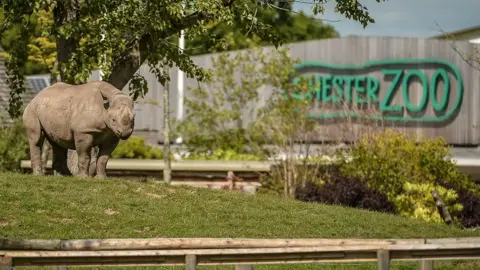Chester Zoo: Covid funding issues threaten endangered animals
 Chester Zoo
Chester ZooEndangered species may "die out" because Chester Zoo cannot access government funding aimed at covering its coronavirus-related losses.
Chief operating officer Jamie Christon said the strict eligibility criteria for the government's £100m Zoo Animals Fund had stopped the zoo applying, putting breeding projects at risk.
About £2.2m of the fund has been awarded since it launched in August.
The government said criteria had been "expanded" to allow more applications.
Chester Zoo runs 80 conservation projects in 30 countries and is the world's third-largest funder of species conservation, housing many captive breeding programmes on its Cheshire site.
'Sit down and talk'
The zoo costs more than £1.6m a month to run and gets 97% of its income from visitors.
A campaign to support it raised £1m in 24 hours shortly before it reopened in June, but a spokesman said at the time it could still face a year-end debt of £24m.
Visitor numbers since reopening have been approximately 50% lower than normal to allow for social distancing.
It has cut 47 jobs since June in a bid to lower costs, but Mr Christon said the lack of government support meant projects "may end up having to be stopped and some of these species may die out altogether".
Amphibian and reptile keeper Adam Trimmings, who helps care for the only population of critically endangered Bermuda skinks outside Bermuda, said ending the captive breeding programme would mean the species would be "gone forever" if their native habitat was destroyed.
Labour's Ellesmere Port and Neston MP Justin Madders said the government needed to "sit down and talk [with zoos] to understand what the barriers are" to accessing the fund, while his Tory counterpart in Warrington South, Andy Carter, said its remit needed expanding to ensure conservation and biodiversity work was "carried out".
The Department for Environment, Food and Rural Affairs said it had "expanded the eligibility criteria" and was currently assessing eight applications for the fund.

Why not follow BBC North West on Facebook, Twitter and Instagram? You can also send story ideas to [email protected]
